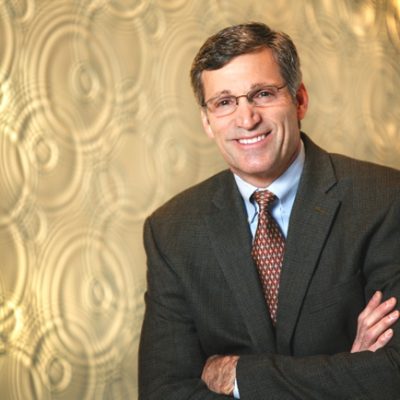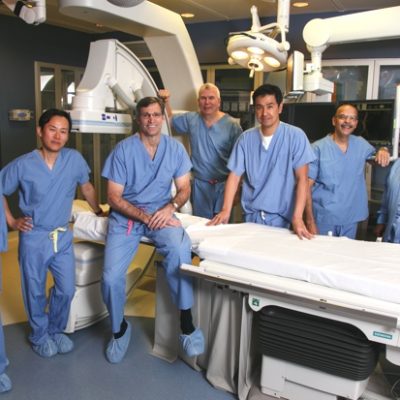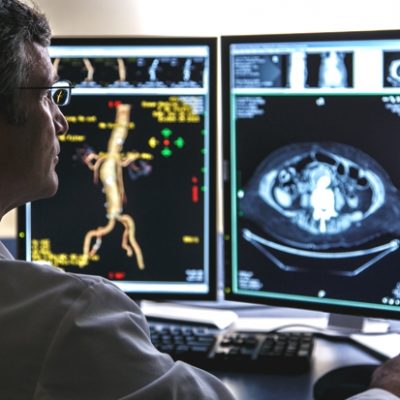
Meridian’s Cardiovascular Network covers a complete range of heart and vascular services, from prevention and diagnosis to advanced surgery, rehabilitation, and recovery
Photos By Amessé Photography
Over the past decade, thanks to vast technological advances and constant studies, the subspecialty of vascular surgery has evolved and advanced. And with a range of cutting-edge endovascular treatments and an abundance of vital community resources, the Meridian CardioVascular Network remains at the field’s forefront.
“Cardiovascular disease covers a lot of ground,” noted Dr. Frank Sharp, chairperson for the Vascular sub-committee of the Meridian CardioVascular Network and a board certified general and vascular surgeon at Ocean Medical Center. “Cardiologists and cardiac surgeons deal with disease of the heart, but vascular disease is anything outside of the heart—legs, abdomen, neck, and even the brain can be the domain of vascular surgeons.”
So Meridian’s CardioVascular Network, which covers a complete range of heart and vascular services—from prevention and diagnosis to advanced surgery, rehabilitation, and recovery— addresses a broad spectrum of disease.
“We deal with the problems of the arteries, which are essentially the plumbing of the heart Multiple specialties are involved and a multitude of diseases are treated,” Dr. Sharp said. “Peripheral artery disease, aneurysms, carotid artery disease, even varicose vein and blood clot treatment—we cover a lot of territory here.”
Meridian offers continuity of care for all vascular problems, including carotid stenting, peripheral work/wound care, venus disease, and full dialysis access, creation, and care. The trend toward endovascular repair and other minimally invasive procedures is also evident within the health group.
“The greatest transition over the past 15 years has been that from open surgical procedures to endovascular, catheter-based techniques,” Sharp said. “A lot of vascular diseases can now be treated with these minimally invasive techniques; the trend has been towards fewer big, open operative procedures.”
Those endovascular and hybrid treatments are performed in Meridian’s next generation operating room.
“The CardioVascular Suite is a hybrid OR and imaging space where we do open surgery, endoscopic surgery, and hybrid surgery,” Sharp said. “Twenty years ago, vascular surgeons needed to bring a portable x-ray unit into the operating room, but now, there is a dedicated room with a large ceiling-mounted x-ray machine—very high-end and sophisticated…the latest and greatest in both laparoscopic and robotic surgery. We can perform open surgery in that room, as well as endovascular procedures, and also have the capabilities to do hybrid procedures as well, which combines both traditional and emerging technologies.”
Those newer treatments offer advantages in terms of patient recovery, Sharp explained, as well as fewer pain medications and more advanced equipment and imaging, which allows doctors to perform procedures with less risk and complications.
For Dr. Sharp, who earned his undergraduate degree at Washington University in St. Louis before enrolling in the former New Jersey Medical School, the advances represent a tremendous opportunity to help patients.
“When I was in the midst of my general surgery program at the University of Medicine and Dentistry of New Jersey, the people I looked up to and admired most were vascular surgeons,” he recalled. “They had skills that solved all sorts of predicaments, and I thought it would make me a better general surgeon if I had those skills too.”
After completing his vascular fellowship at the University of Massachusetts Medical School, Dr. Sharp joined the Meridian staff in 1991.
“Throughout much of the 1990s and into the early 2000s, it was always sort of a vision of ours to have a vascular institute at this campus,” he noted. “And it ultimately opened in 2002.”
Twelve years later, that institute is focused upon providing state-of-the-art vascular resources to the community it serves, while educating the public on proper prevention and diagnosis— and there are currently a number of initiatives taking place at Meridian CardioVascular Network that helps it to meet all those goals.
“The largest initiative on the vascular side of the network is data collection,” explained Sharp. “Outside of physicians having knowledge of their own results, there has never been a large vascular database, but now one exists. The Vascular Quality Initiative (VQI) has been developed through the Society for Vascular Surgery, a national, cloud-based registry that collects both demographic and procedural data on all of vascular procedures being performed. Not every hospital in the country participates, but we have made a commitment at Meridian to do so, because having that data will allow us to improve our own quality and evaluate how well we’re doing.”
Meridian’s multidisciplinary approach is also a big part of the equation.
“Since vascular disease presents itself in multiple places in the body, it’s logical for us to offer a multidisciplinary approach to our patients,” said Sharp. “It’s very typical for a patient I see to be under the care of a cardiologist in addition to an internist, neurologist, or nephrologist. Our goal is to provide a coordinated effort for each patient— working together, cooperating on care, and learning from each other at the same time.”
To Sharp, that’s why patient education is so important—because so many diseases are either preventable or controllable.
“If we can control risk factors like diabetes, high blood pressure and cholesterol with the right diet and exercise, maybe some medicine and smoking cessation, vascular disease won’t necessarily go away, but it will quiet down. This is something that is controllable if we simply educate our patients and teach them to look for the right risk factors.”
Tools like AngioScreen are beneficial in helping patients identify if there is a problem.
“Medicine has changed a great deal,” Sharp said. “And while a thorough exam by a physician used to be the only way to determine if an illness existed, there are now other tools that can help. AngioScreen is a relatively low-cost basic screening technology that is non-invasive and will give a quick answer. It’s not detailed, but it will offer patients peace of mind.”
Additional screening for aortic aneurism should be performed if there is a family history and if the patient has Peripheral Artery Disease (PAD), a common circulatory problem in which narrowed arteries reduce blood flow to the limbs. Patients should also be screened for cardiac disease as well as a carotid screening to determine risk factor for stroke.
“PAD is the same disease that occurs in an artery of the heart,” Sharp said. “Just as the arteries of the heart muscle narrow and become clogged with plaque, the same concept occurs in the arteries that bring blood to the legs. Those with mild areas of narrowing may not be aware they have it and if they are somewhat sedentary they may be completely unaware. But those who are active or have more significant narrowing will experience leg muscle fatigue often brought on by walking. In the most severe cases where the narrowing is very severe, there can be pain at rest and patients run the risk of limb loss or wounds in the feet that will not heal.”
All these are signs and symptoms that patients should watch for, but perhaps the most important thing that should remember about vascular health is to remain proactive.
“There’s a simple message here,” Sharp concluded. “People need to assess whether or not they have these kinds of problems or symptoms and determine whether or not they are at risk. Ask your family doctor about it and if you can, prevent some of these things from happening. If you do determine that there is a problem, get the appropriate help. We have these top-notch services right here in New Jersey. You don’t have to travel to a major city to have the screening. These conditions can be treated right here in your own backyard.”
Meridian Cardio Vascular Network
Ocean Medical Center
425 Jack Martin Blvd., Brick
732.840.2200 / meridiancardiovascularnetwork.com







